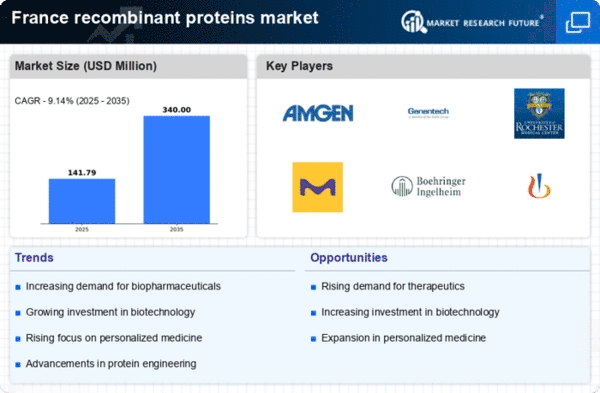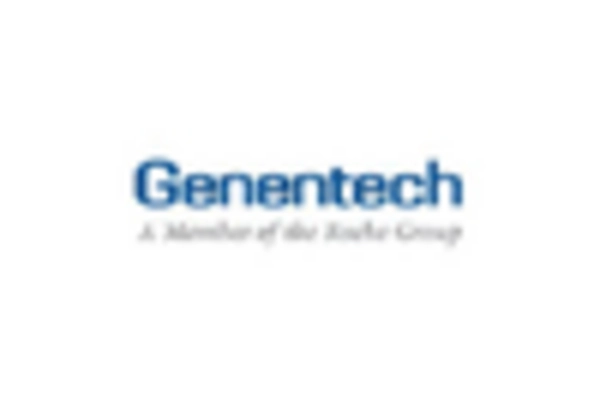Advancements in Biotechnology
The recombinant proteins market in France is experiencing a surge due to advancements in biotechnology. Innovations in genetic engineering and protein expression systems have enhanced the efficiency and yield of recombinant proteins. This has led to a broader application of these proteins in therapeutics and diagnostics. The French biotechnology sector is robust, with over 1,000 companies actively engaged in biopharmaceutical development. As a result, the market is projected to grow at a CAGR of approximately 8% over the next five years. This growth is driven by the increasing need for novel therapies and the rising prevalence of chronic diseases, which necessitate the development of effective biologics. The advancements in biotechnology not only improve production processes but also reduce costs, making recombinant proteins more accessible in the healthcare system.
Growing Investment in Healthcare
Investment in healthcare infrastructure in France is significantly impacting the recombinant proteins market. The French government has committed to increasing healthcare spending, which is projected to reach €250 billion by 2026. This increase in funding is likely to enhance research capabilities and expand the production of recombinant proteins. Additionally, private sector investments are also on the rise, with venture capital flowing into biotechnology firms focused on developing innovative therapies. The growing emphasis on personalized medicine and targeted therapies is further driving the demand for recombinant proteins. As healthcare investments continue to grow, the recombinant proteins market is expected to expand, providing new opportunities for companies involved in the development and production of these essential biopharmaceuticals.
Regulatory Support and Frameworks
The regulatory environment in France plays a crucial role in shaping the recombinant proteins market. The French government, along with the European Medicines Agency, has established clear guidelines for the development and commercialization of biologics. This regulatory support fosters innovation and encourages investment in the recombinant proteins sector. The streamlined approval processes for new therapies have resulted in a quicker time-to-market for recombinant proteins, which is vital in addressing urgent healthcare needs. Furthermore, the French government has allocated substantial funding to support biopharmaceutical research, which is expected to enhance the market landscape. As a result, the recombinant proteins market is likely to benefit from a favorable regulatory framework that promotes safety and efficacy while encouraging scientific advancements.
Rising Prevalence of Chronic Diseases
The rising prevalence of chronic diseases in France is a significant driver for the recombinant proteins market. Conditions such as diabetes, cancer, and autoimmune disorders are becoming increasingly common, necessitating the development of effective treatment options. The French healthcare system is under pressure to provide innovative therapies that can address these health challenges. Recombinant proteins, known for their therapeutic efficacy, are at the forefront of this effort. The market is expected to grow as healthcare providers seek advanced solutions to manage chronic conditions. According to recent statistics, chronic diseases account for approximately 70% of healthcare costs in France, highlighting the urgent need for effective biologics. This trend suggests that the recombinant proteins market will continue to thrive as it aligns with the healthcare priorities of the nation.
Collaboration Between Academia and Industry
Collaboration between academic institutions and the biotechnology industry is fostering innovation in the recombinant proteins market. In France, numerous partnerships are emerging, aimed at translating research findings into practical applications. These collaborations often lead to the development of novel recombinant proteins with enhanced therapeutic properties. French universities and research centers are increasingly engaging with biotech firms to leverage their expertise in protein engineering and production. This synergy not only accelerates the research and development process but also enhances the competitiveness of the recombinant proteins market. As these partnerships grow, they are likely to yield breakthroughs that could redefine treatment paradigms in various therapeutic areas, thereby expanding the market's potential.
















